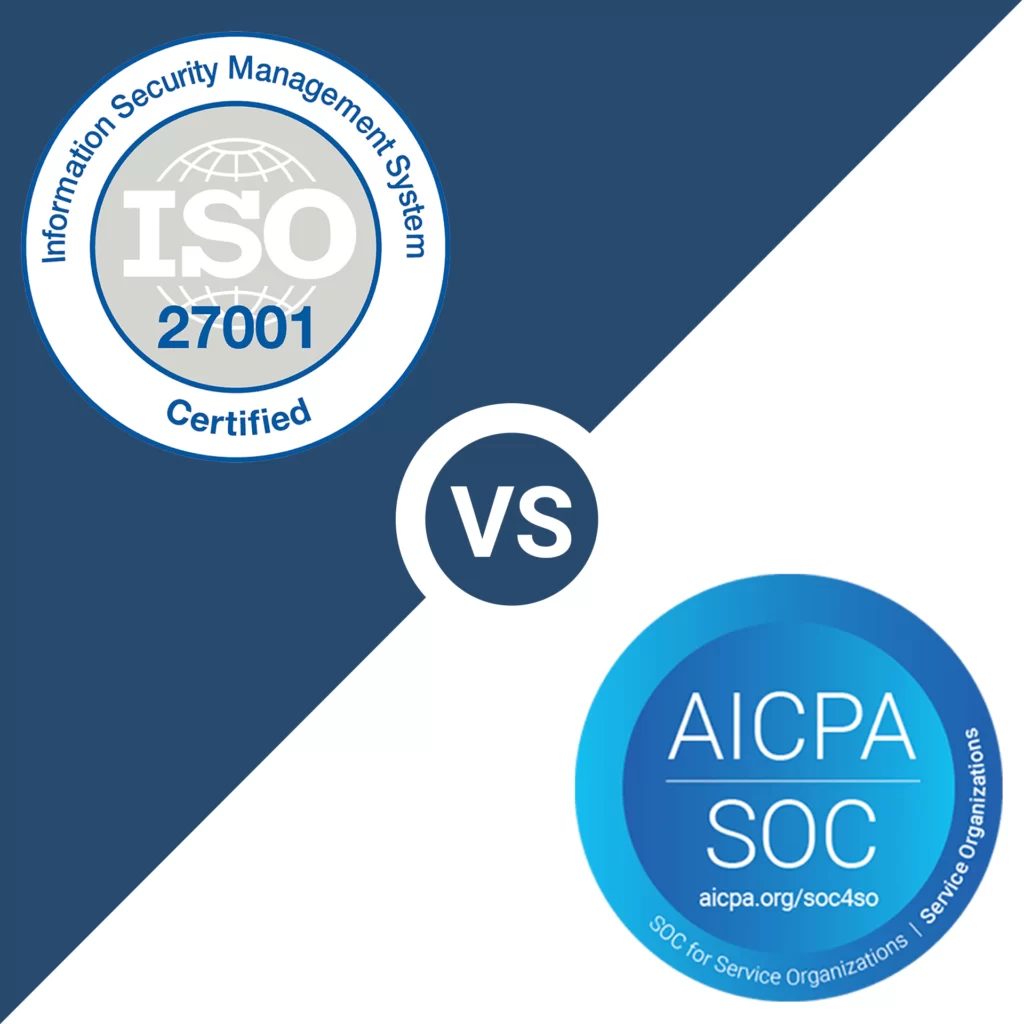Data breaches present by far the most significant risk to businesses in the digital age. Each year, breach attempts become more numerous, grow more sophisticated and have greater financial consequences. Many organizations are not only compiling a comprehensive security plan but also seeking outside audits to verify that their company data is secure. There are many varieties of security plan attestation and certification. Every business should strive to understand and thoughtfully compare ISO 27001 vs. SOC 2.

How Can an Organization Compare ISO 27001 vs. SOC 2?
Both ISO 27001 and SOC 2 use outside evaluators to verify a company’s data security measures and overall defenses against breaches. In addition, there are two types of SOC 2 evaluations: SOC 2 Type 1 and SOC 2 Type 2.
Each of these evaluations requires different documentation and tests for different security requirements. Of all these options, only ISO 27001 technically provides a certification. Both types of SOC 2 evaluations offer an attestation report, instead.
What Is ISO 27001?
The current international standard for data security measures is ISO 27001, a set of standards put forth by the International Organization of Standardization. ISO 27001 certification has steadily grown in prominence over the past five years as data breaches have become more common and costly. According to a 2021 analysis of over 900,000 websites, 29.7%of firms advertised ISO 27001 compliance on their websites while 29.8% of firms referred to a partner that had achieved ISO 27001 compliance.
The goal of ISO 27001 certification is a functional and complete Information Security Management System. Auditors require hard evidence that employees at all levels of a company follow security procedures. The company must base these procedures on written methodology They must also achieve measurable and specific goals that ultimately lower the risk of data breaches. Much of understanding ISO 27001 vs. SOC 2 is conceptualizing the differences in the scope and amount of work these two processes require.
What Is SOC 2 Type 1?
The goals of SOC 2 Type 1 attestation are much smaller in scope than ISO 27001 certification. SOC 2 Type 1 only evaluates data security at one moment in time. ISO 27001 certification includes long-term planning steps that are not required for SOC 2 Type 1 attestation.
SOC 2 Type 1 is also more flexible in its requirements than ISO 27001. The five SOC 2 criteria are security, availability, processing integrity, confidentiality, and privacy. Of those criteria, only security is mandatory. Most SOC 2 requirements vary based on the type of business and its data, similar to the optional Annex A controls in ISO 27001.
Overall, SOC Type 1 is a simpler process than ISO 27001 that ensures a company has basic data security measures in place. SOC Type 1 is the least intensive data security audit option and also the least expensive. A certified public accountant conducts these audits, rather than an independent international auditor working for the ISO. SOC attestation is less useful outside of North America.
What Is SOC 2 Type 2?
The long-term variant of SOC 2 is Type 2. This audit evaluates a business’s security plan on a time scale of six months to one year.
The flexibility of SOC 2 Type 1 is also present in SOC 2 Type 2, as the CPA performing the audit takes the scope of the specific business into consideration rather than issuing blanket requirements. SOC 2 Type 2 evaluation is a clear and straightforward way to develop a security plan and prove that the plan is effective over time, though it is not a full international certification.
What Is the Overlap Between ISO 27001 and SOC 2?

There is considerable overlap in the purposes, processes and outcomes of ISO 27001 and SOC 2 certification. Both aim to improve an organization’s information security protocols with the help of an independent auditor. They both also offer certifications that can signal to partners, consumers and stakeholders that a tested information security plan is in place.
Unlike SOC Type 1, SOC Type 2 evaluates how an organization’s security plan performs over time, which overlaps with ISO 27001 certification. Many of the steps of ISO 27001 certification can be used to achieve SOC Type 2 attestation as well. Finally, both ISO 27001 and SOC contain provisions and controls that are customized or combined to tailor a security plan to each unique business’s sensitive information and needs.
ISO 27001 vs. SOC 2: How Do the Processes Compare?
The goals and scope of these three evaluations differ widely, and so do their preparation and audit procedures. Here are the basics of each process.
ISO 27001 Process
Preparing for an ISO 27001 audit involves months of work at all levels of an organization. The most efficient way to address all ISO 27001 clauses involves a set of six documents:
- ISMS Scope Document: Defines the assets the plan must protect
- Comprehensive Information Security Policy: Includes hard evidence of security protocols’ effectiveness, such as testing data over time
- Risk Assessment and Methodology Report: Lists each data security risk, its priority and the logic used to evaluate each risk
- Statement of Applicability: Addresses 114 optional security concerns in Annex A
- Risk Treatment Plan: Uses specific, auditor-approved methods to address each risk
- List of Security Objectives: Includes tangible data on testing and security to show how close the business is to meeting each objective
An ISO auditor reviews this documentation, looking for an abundance of data, actionable security policies and proof that the policies work. Organizations that pass the audit receive ISO 27001 certification. When comparing ISO 27001 vs. SOC 2, keep in mind that the ISO 27001 process is more rigorous and requires more documentation.
SOC 2 Type 1 Process
SOC 2 Type 1 evaluation tests that a company has basic data security measures in place. These include firewalls and two-factor identification. Businesses file a single report on security measures, rather than six documents, which results in a much faster timeframe than ISO 27001. Auditors interview staff on policies and may tour physical offices before delivering an evaluation.
SOC 2 Type 2 Process
The SOC 2 Type 2 process is a more intensive version of Type 1. In addition to Type 1 steps, the auditor tests the business’s security measures for six months to a year and documents the test results. After the tests, the auditor delivers the testing data and an opinion on the business’s security.

Why Use a GRC?
GRC represents a paradigm shift in risk management by providing an integrated framework for addressing governance, risk, and compliance concerns within a single platform. It offers several compelling reasons for organizations to adopt it:
- Simplifying audits and data processing
- Saving costs on compliance and information security
- Gathering key information in one accessible platform
- Automating data gathering for continuous compliance
GRC can help a business achieve successful ISO 27001 and SOC 2 audits while improving overall compliance and information security.
Which Is More Important: ISO 27001 Certification or SOC 2 Compliance?
Any business with global aspirations should aim for full ISO 27001 certification. This broadcasts to consumers and partners around the world that the business has a robust and effective security system. SOC 2 compliance is a comparatively easier and less expensive process that is useful for checking security on an ongoing basis.
How Can a Business Better Understand ISO 27001 vs. SOC 2 Compliance?
Understanding and comparing ISO 27001 vs SOC 2 is the first of many steps toward improving information security within an organization. Hard evidence is vital for both data security evaluations. At Compyl, our automated platform can make crafting an evidence-based cybersecurity plan easier than ever before.
Request a demo to learn more about data security and continuous compliance.




